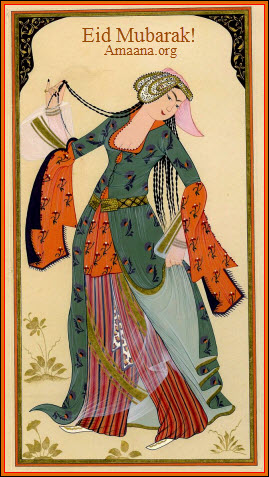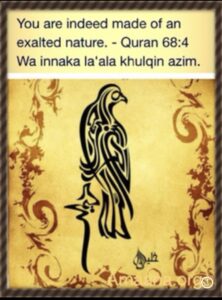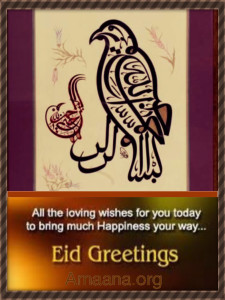
Eid ul-Fitr is the Arabic name of this religious holiday. Eid meaning “festivity” and Fitr meaning “original nature.” Fitra refers to the returning to our Godly nature, to make our selves worthy of merging with God as we have been created in His image.

You are indeed made of an exalted nature. Wa innaka la’ala khulkin azim. – Quran 68:4
Ramadan is the ninth month of the Muslim lunar year. It has double significance as this is the month that the Holy Quran was revealed to Prophet Muhammad and that night has been called the Night of Power – Layla-tul Qadr, where Angel Gabriel appeared to Prophet Muhammad and declared the first verse of the Holy Quran on this night, the night where a single moment of enlightenment of the Light of Allah converts the night into a period of Spiritual glory and majesty that touches eternity. Pious Muslims strive to make themselves pure, especially during this month, by ritual and spiritual observances to make ready for Companionship on High. This month has been declared sacred in the Holy Quran wherein God says:
2:183 – O you who believe, fasting is prescribed on you as it was prescribed to those before you so that you may become self-restrained.
2:185 – The prescribed fasting is for a fixed number of days, but whoso among you is sick or on a journey, shall fast the same number of other days; and for those who are able to fast only with great difficulty, is an expiation – the feeding of a poor man. And whoso does good of his own accord it is better for him. And fasting is good for you, if you only knew.
For the last 1400 years, over one billion Muslims throughout the world, the faithful, pay special attention to the esoteric (batin) matters by practicing the exoteric (zaher) fasting. Besides holding a fast from food and water from sunrise to sunset, believers also refrain from dishonesty, stealing, unethical actions, and other activities that would lead one astray. A Momin’s (believer’s) life is a journey to become one with the Essence and her daily life is a mirror of her spiritual beauty. A Muslim lives a daily life of piety which includes practice of faith and taking care of life, Din and Duniya, that means, working for the family, learning, earning and taking part in society whilst also maintaining a relationship with the Creator-on-high. So the tasbi (rosary) will be in constant use by the devout to remember God and to recall this link of matter with the Spirit and the Universal Soul.
During Ramadan, Muslims fast from sun-up to sun-down daily for 30 days, and so do not have anything to eat, drink, smoke and keep away from sexual relations during that period. A special feast is prepared for the breaking of the fast each evening, iftar, where everyone present is invited to partake of the dinner after the all-day fast when prayers of thanks are offered for a successful fast and family and friends reconnect and rejoice for remembering their duty to God and for striving to be pious.
The month ends with special festivities on the Eid al-Fitr (Day of Feasting) celebration when families and friends truly rejoice for having completed the commandment of Allah by successful abstinence from food and drink and by practicing Dhikr (Arabic), Zikr (Farsi and Urdu), (remembrance of God) at all times.
Here is our 48th Imam Mowlana Sultan Mahomed Shah Aga Khan III’s view on fasting:
“The healthy human body is the temple in which the flame of the Holy Spirit burns, and thus it deserves the respect of scrupulous cleanliness and personal hygiene. Prayer is a daily necessity, a direct communication of the spark with the Universal flame. Reasonable fasting for a month in every year, provided a man’s health is not impaired thereby, is an essential part of the body’s discipline – through which the body learns to renounce all impure desires. Adultery, alcoholism, slander and thinking evil of one’s neighbour are specifically and severely condemned. All men, rich and poor, must aid one another materially and personally. The rules vary in detail, but they all maintain the principle of universal mutual aid in the Muslim fraternity. This fraternity is absolute, and it comprises men of all colours and all races: black, white, yellow, tawny; all are the sons of Adam in the flesh and all carry in them spark of the Divine Light. Everyone should strive his best to see that this spark be not extinguished but rather developed to that full “Companionship-on-High” which was the vision expressed in the last words of the Prophet on his deathbed, the vision of that blessed state which he saw clearly awaiting him. In Islam the Faithful believe in Divine justice and are convinced that the solution of the great problem of predestination and free will is to be found in the compromise that God knows what man is going to do, but that man is free to do it or not.”
Full text at: Memoirs – Religion of my Ancestors
And here, Mowlana Hazar Imam – His Highness the Aga Khan, discusses fasting in his interview with Nicolas Tomalin:
NT: You’ve told me the ways in which your faith makes it easier to come to terms with the modern world. Are there any ways in which it is more difficult?
AK: Islam is a way of life, much more than Christianity. That is an old, boring thing to say, but it’s true. Now if we are to modernise our society we have to come into contact with totally different traditions. Basically the Ismaili Muslims have a choice between the Communist East, which would prevent us teaching our children the Faith, and the West, which has a set of materialistic and religious standards which are often at variance with ours. Imagine our difficulties seeing a civilisation which is at least twenty years ahead of us in roads, hospitals, and standards of living, but which if we imitate too closely will obliterate the reality of our Faith. Sometimes we are faced with the choice of either accepting habits and customs which have proved economically successful in the West, but go against what our Faith tells us to do, or continuing in our old ways, thus jeopardising our economic development.
I will give you a simple example. One of our factories making jute, for instance, in East Pakistan. In a Western society a factory like that is working 24 hours a day, six days a week all year round. But in an Islamic society that factory can work 24 hours a day, yes, but with five breaks for prayers and a complete break in the month of Ramadan, when the working force is reduced to less than half by fasting.
This is a terrible practical problem. Even among Muslim States they do not agree whether or not to work full time during Ramadan.
NT: How would you advise your communities?
AK: I think if it was, say, a steel factory in a time of national emergency, of war or something like that, then I would advise them to work during Ramadan. If it were peace, and the production were not so vital, then I would advise them to observe Ramadan.
But the real question is, where does one stop? If we are always importing from the West techniques to develop our economics, how can we stop importing alien ideas? You can imagine the problem. Every time we send our young men to Western Universities seven out of ten of them come back with alien traditions and tendencies of which they may be unconscious.
NT: You were a young man who went to a Western university. Did this happen to you?
AK: Yes perhaps. But I think I understand the difficulties and hope to have overcome some of them.
Read full interview at Nanowisdoms
At the end of the 30 day fast, Chandraat, the new moon, is celebrated that evening and the next morning on the 1st day of the new month Shawwal that follows Ramadan is Eid al Fitr which begins with morning congregational prayers and afterwards great rejoicing by greeting each other and thanking God for having completed the extra pious duties successfully and children are rewarded with Eidi, a small gift of money or sweets and many gift exchanges take place followed by a feast.
The extra prayerful month leaves a mark on the faithful as the believer is forever transformed for his/her close communication with God by these material and spiritual practices. One continues this practice all year and reaps the benefits by remaining ever vigilant to her duty to her Lord from Whom we have come and to Him is our return. Inna Lillahi wa inna Illaiyhi Raajeoon!
In Turkey it is called Ramazan Bayramı (Ramadan Feast) taking its name from the Ramadan. Şeker Bayramı (Sugar Feast) as a lot of sweet dishes are prepared and served including Baklava and others. The devout celebrate after having completed the month of fasting, charitable giving, pious deeds and prayers successfully and vow to carry on the good and ethical works all year in helping others and bringing about justice, equality and peace. Many Muslims give to charitable organizations to help the less fortunate as they believe that what they give will bring hope and succor to others and God will multiply their abundance manifold. Starting with the morning prayers on the first day of the month of Shawwal, which follows Ramadan, greetings are exchanged by loving and joyous hugs and children are given an Eidi, a gift of money followed by great rejoicing, sharing food and having picnics.
Since I have covered in more details information on Ramadan, Eid, and Layla tul Qadr on my previous articles, I thought I would feature some of the messages from the White House by President Biden, as I have highlighted messages from President Obama, President Bush and before him President Clinton on my articles at the links below.
 Eid Mubarak! We share our warmest and joyous wishes with you and your families and sincerely pray that wars end all over the world and that no human should need to take another human’s life and with education and understanding we can bring about peace on this earth.
Eid Mubarak! We share our warmest and joyous wishes with you and your families and sincerely pray that wars end all over the world and that no human should need to take another human’s life and with education and understanding we can bring about peace on this earth.
Statement by President Joseph R. Biden, Jr. on the Upcoming White House Eid Celebration
Jill and I are looking forward to the White House’s commemoration of Eid this Sunday. We were heartened to see Eid celebrations around the world, but we know that this year, the situation in the Holy Land is weighing heavily on Muslims everywhere, including our Muslim communities here in the United States.
Palestinians—including in Gaza—and Israelis equally deserve to live in dignity, safety and security. No family should have to fear for their safety within their own home or place of worship. We think most about the children in these societies who face trauma from a conflict far beyond their control.
My administration will continue to engage Palestinians, Israelis, and other regional partners to work towards a sustainable calm.
Statement by President Obama on the Occasion of Eid-al-Fitr
As Muslims throughout the United States and around the world celebrate Eid-al-Fitr, Michelle and I extend our warmest wishes to them and their families. This last month has been a time of fasting, reflection, spiritual renewal, and service to the less fortunate. While Eid marks the completion of Ramadan, it also celebrates the common values that unite us in our humanity and reinforces the obligations that people of all faiths have to each other, especially those impacted by poverty, conflict, and disease.
In the United States, Eid also reminds us of the many achievements and contributions of Muslim Americans to building the very fabric of our nation and strengthening the core of our democracy. That is why we stand with people of all faiths, here at home and around the world, to protect and advance their rights to prosper, and we welcome their commitment to giving back to their communities.
On behalf of the Administration, we wish Muslims in the United States and around the world a blessed and joyous celebration. Eid Mubarak.
♥
Statement by President Obama on the Occasion of Eid-al-Fitr
Michelle and I extend our warmest wishes to Muslim communities in the United States and around the world as they celebrate Eid-al-Fitr. For Muslims, Ramadan has been a time of fasting, prayer and spiritual renewal. These past four weeks have also been a time to serve the less fortunate — a reminder of the obligations that people of all faiths have to each other.
In the United States, Eid-al-Fitr speaks to the truth that communities of faith — including Muslim Americans — enrich our national life, strengthen our democracy and uphold our freedoms, including the freedom of religion. That is why the we stand with people of all faiths, in the United States and around the world, in protecting and advancing this universal human right.
On behalf of the American people, we congratulate Muslim Americans and Muslims around the world on this joyous day. Eid Mubarak.
♥
♥
Below is the text of a web video from President Obama marking the beginning of Ramadan on August 21, 2009. Video of the President’s message is available HERE.
Ramadan Message
Washington, DC
 Eid and Related Articles
Eid and Related Articles
- Layla tul Qadr – The Night of Power and Destiny
- The Month of Ramadan is Here!
- Ramadan Page from previous years
- Ramadan Kareem and Eid ul-Fitr – Eid Mubarak!
- Layla tul Qadr – The Night of Power
- Muslim Holidays
- Salwaat Music non-stop for Ramadan
- Ramadan Poems by Rumi
- Abraham and Ishmael – Eid ul Adha – Festival of Offering
- Companionship-on-High
- Islamic lunar calendar
- Prophet Muhammad
- Night of Power – Layla-tul Qadr
- Ramadan Poetry by Rumi
- Layla tul Qadr The Night of Power
- Ramadan Poems by Rumi
- Ramadan and Eid ul Fitr | Ismaili Web Amaana
- Layla tul Qadr – The Night of Power
- Layla tul Qadr – The Night of Power and Destiny
- Ramadan Kareem and Eid ul-Fitr – Eid Mubarak!
- Nowruz Persian New Year – Eid Mubarak!
- Miraj wa Isra – Ascension and Night Journey of Prophet Muhammad
- Ramadan Kareem and Eid ul-Fitr – Eid Mubarak!
- Ramadan and Eid ul Fitr | Ismaili Web Amaana
- Eid ul-Fitr Ramadan Kareem – Eid Mubarak!
- Eid-e Ghadir – Declaration at Gadhir e Khumm
-
Eid ul Adha – Abraham and Ishmael Festival of Offering
- Nowruz Persian New Year – Eid Mubarak!
- Ramadan Page from previous years
- Calendar Converter